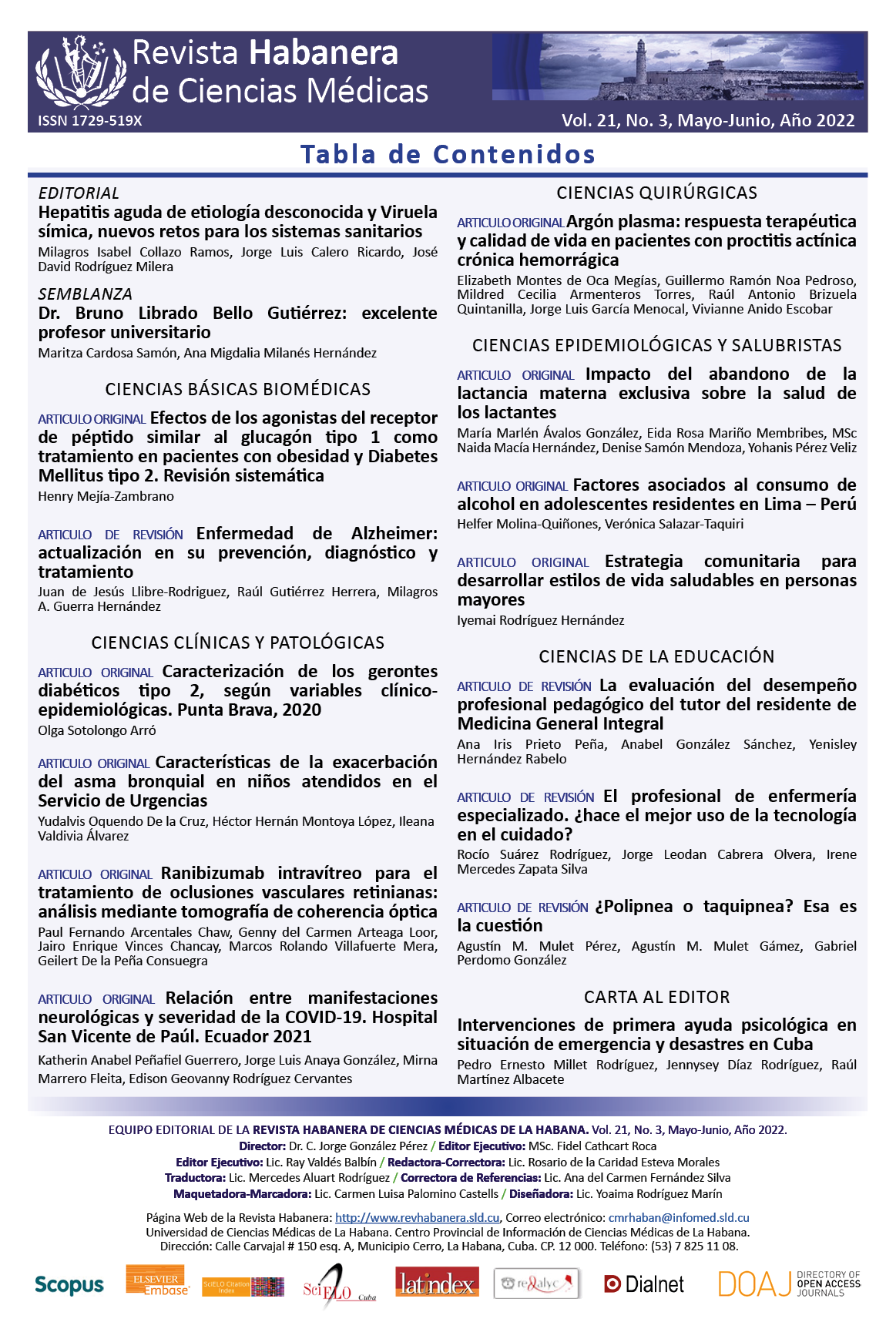Enfermedad de Alzheimer: actualización en su prevención, diagnóstico y tratamiento
Palabras clave:
demencia, enfermedad de Alzheimer, prevención, diagnóstico, tratamientoResumen
Introducción: En el mundo, 55 millones de personas viven con demencia. Se estima que este número se incrementará a 82 millones en 2030 y 152 millones en 2050, a menos que se implementen intervenciones que permitan su prevención, retardar su comienzo, enlentecer o detener su progresión.
Objetivo: Actualizar sobre los cambios recientes en la epidemiologia, diagnóstico y tratamiento de la enfermedad de Alzheimer.
Material y Métodos: Revisión de la literatura sobre el tema, publicada entre el 1 de enero de 2010 y el 30 de diciembre de 2021, que incluyó las bases de datos (PubMed/MEDLINE, EMBASE, Lilacs, SciELO y Cochrane CENTRAL, utilizando los términos “Alzheimer”, OR “demencia”, OR “deterioro cognitivo”.
Desarrollo: Los gobiernos deben prepararse para un tsunami de demanda de servicios de salud como resultado del envejecimiento de la población mundial, la mejora de los diagnósticos, incluidos los biomarcadores y los tratamientos farmacológicos emergentes. La detección oportuna del deterioro cognitivo, el diagnóstico causal y el manejo adecuado de la entidad nosológica es crucial.
Conclusiones. Los sistemas de salud a nivel mundial deberían introducir evaluaciones de la función cognitiva para las personas mayores de 55 años, facilitados por la evolución en la ciencia de los biomarcadores, con la oportunidad de promover estrategias de reducción de riesgos. La existencia de factores de riesgo potencialmente modificables significa que la prevención de la demencia es posible mediante una estrategia de salud pública, con intervenciones claves que retrasen o desaceleren el comienzo del deterioro cognitivo y la demencia.Descargas
Citas
1. Gauthier S, Rosa Neto P, Morais JA, Webster C. World Alzheimer Report 2021: Journey through the diagnosis of dementia [Internet]. London: Alzheimer’s Disease International; 2021 [Citado 01/01/2022]. Disponible en: https://www.alzint.org/resource/world-alzheimer-report-2021/
2. Tsao C, Aday A, Almarzooq Z, Alonso A, Beaton A. Heart Disease and Stroke Statistics—2022 Update: A Report From the American Heart Association. Circulación. 2022; 145:153-639.
3. Moher D, Liberati A, Tetzlaff J, Altman DG. Preferred reporting items for systematic reviews and meta-analyses: The PRISMA statement. BMJ 2009; 339:332-6.
4. Scheltens P, De Strooper B, Kivipelto M, Holstege H, Chételat G, Teunissen CE, t al. Alzheimer’s disease. Lancet. 2021; 397:1577-90.
5. Organización Mundial de la Salud. Plan de acción mundial sobre la respuesta de salud pública a la demencia 2017-2025 [Internet]. Ginebra: Organización Mundial de la Salud; 2017 [Citado 01/01/2022] Disponible en: https://www.who.int/mental_health/neurology/dementia/action_plan_2017_2025/en/
6. GBD 2019 Dementia Forecasting Collaborators. Estimation of the global prevalence of dementia in 2019 and forecasted prevalence in 2050: an analysis for the Global Burden of Disease Study 2019. Lancet Public Health, 2022; S2468-2667(21):00249-8.
7. JLlibre Rodríguez JJ, Valhuerdi A, López AM, Noriega. Cuba´s Aging and Alzheimer Longitudinal Study. MEDICC Review. 2017;19(1).
8. Livingston G, Huntley J, Sommerlad A, Ames D, Ballard C, Banerjee S, et al. Dementia prevention, intervention, and care: 2020 report of the Lancet Commission. Lancet. 2020; 396:413-26.
9. Loy CT, Schofield PR, Turner AM. Genetics of dementia. Lancet 2014; 383(9919):828-40.
10. Liu CC, Kanekiyo T, Xu H, Bu G. Apolipoprotein E and Alzheimer disease: risk, mechanisms and therapy. Nat. Rev. Neurol.2013; 9:106-118.
11. McDade E, Libre Guerra JJ, Holtzman DM, Morris JC, Randall JB. The informed road map to prevention of Alzheimer Disease- a call to arms. Molecular Neurodegeneration. 2021;16(49): 2-19.
12. Petersen RC, Lopez O, Armstrong MJ. Practice guideline update summary: mild cognitive impairment: report of the guideline development, dissemination, and implementation subcommittee of the American Academy of Neurology. Neurology. 2018; 90(3):126-35.
13. McKhann G, Drachmann D, Folstein M. Clinical diagnosis of Alzheimer’s disease: report of the NINCDS-ADRDA Work Group under the auspices of Department of Health and Human Services Task Force on Alzheimer’s Disease. Neurology. 1984; 34:939-44.
14. Dubois B, Villain N, Frisoni GB, Rabinovici GD, Sabbagh M, Cappa S, et al. Clinical diagnosis of Alzheimer’s disease: recommendations of the International Working Group. Lancet Neurol. 2021; 20:484-96.
15. Atri A. The Alzheimer´s Disease Clinical Spectrum. Diagnosis and Management. Med Clin N Am 2019; 103: 263-93.
16. National Institute for Health and Care Excellence. Dementia: assessment, management and support for people living with dementia and their carers (NG97) [Internet]. EE UU: National Institute for Health and Care Excellence; 2018 [Citado 01/01/2022] Disponible en: https://pubmed.ncbi.nlm.nih.gov/30011160/
17. Gauthier S, Patterson C, Chertkow H. Recommendations of the 4th Canadian Consensus Conference on the Diagnosis and Treatment of Dementia (CCCDTD4). Can Geriatr J. 2012;15(4):120-6.
18. Howard R, McShane R, Lindesay J. Nursing home placement in the Donepezil and Memantine in Moderate to Severe Alzheimer’s Disease (DOMINO-AD) trial: secondary and post-hoc analyses. Lancet Neurol. 2015; 14(12):1171-81.
19. Patel L, Grossberg G. Combination therapy for Alzheimer’s disease. Drugs & aging. 2011;28: 539-46.
20. Salloway S, Farlow M, McDade E, Clifford DB, Wang G, Llibre Guerra JJ, et al. A trial of gantenerumab or solanezumab in dominantly inherited Alzheimer’s Disease. Nat Med. 2021; 27:1187-96.
21. Cummings J, Aisen P, Lemere C, Atri A, Sabbagh M, Salloway S. Aducanumab produced a clinically meaningful benefit in association with amyloid lowering. Alzheimers Res Ther. 2021;13(1):10-98.
22. Aprueban Registro Sanitario Condicional de NeuroEPO para el tratamiento del Alzheimer leve y moderado. Granma [Internet]. 2022 Mar 8 [Citado 01/01/2022]; Secc. Salud. Disponible en.: https://www.granma.cu/cuba-covid-19/2022-03-08/aprueban-registro-sanitario-condicional-de-neuroepo-para-el-tratamiento-del-alzheimer-leve-y-moderado-08-03-20
23. Kivipelto M, Mangialasche F, Snyder HM, Allegri R, Andrieu S, et al. World-Wide FINGERS Network: a global approach to risk reduction and prevention of dementia. Alzheimer's and Dementia. 2020;16(7):1078-94.



